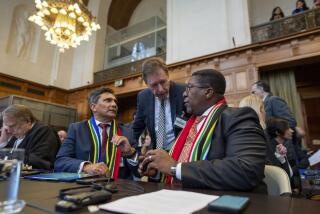Security Council Approves, by 13-0 Vote, French Call to Condemn S. Africa on Apartheid; U.S., Britain Abstain
- Share via
UNITED NATIONS — The Security Council voted 13-0 Friday to adopt a French resolution condemning South Africa for its policy of racial segregation and for imposing emergency rule in some districts a week ago. The United States and Britain abstained.
The resolution urges all member states to apply trade restrictions to force Pretoria to reform.
Before the final vote, the United States and Britain had cast a double veto against an amendment sponsored by African and nonaligned members that would have required the Security Council to consider imposing mandatory economic sanctions if the South Africans do not end the repression of the black majority.
Speaking for U.S. Ambassador Vernon A. Walters, who was in Washington, U.S. delegate Warren Clark Jr. told the council after the vote that despite much criticism the United States will maintain its policy of “constructive engagement” toward South Africa. Isolating the white-minority regime will only make conditions worse for blacks, he said. But he made it clear that Washington supports an early end to apartheid, the segregationist policy.
“The government of South Africa must understand that the question is not whether, but how, apartheid is going to end,” Clark said. “We reiterate our call for serious talks between the government of South Africa and black leaders aimed at establishing a just society in South Africa.”
Passage of the French resolution was a diplomatic triumph for French Ambassador Claude de Kemoularia, who lobbied for his proposal all day Thursday and into the early hours of Friday.
But nonaligned, African and Soviet Bloc members of the council demanded a stronger threat of economic sanctions than that contained in the original French text, which merely urged the 159 members of the United Nations to “take steps” against South Africa such as suspension of all new investment. (France has already ordered a cutoff of new investment in South Africa.)
The resolution also suggested a ban on importation of gold krugerrand coins, suspension of export loans, prohibition of new nuclear power contracts and a ban on the sale of computers for use by South Africa’s army and police.
To win his critics’ support, De Kemoularia on Friday submitted changes that urged member states to “adopt measures” such as the economic penalties contained in the first draft and added a call for restrictions in sports and cultural ties.
Wanted Stronger Wording However, the nonaligned nations wanted still stronger wording and they submitted an amendment warning South Africa that failure to end apartheid and lift the repressive emergency rule “would compel the Security Council to meet forthwith to consider the adoption of proper measures under the United Nations Charter, including Chapter 7.”
That chapter gives the Security Council power to order mandatory sanctions, binding on all member states--an action that the United States has always vetoed, usually joined by Britain and frequently by France.
When the amendment was placed before the council, France abstained but Clark and British Ambassador Peter M. Maxey cast vetoes. (The five permanent members of the 15-nation council--the United States, Britain, France, the Soviet Union and China--hold veto power.)
At one point, it was reported that the nonaligned and African members, hoping for a stronger anti-South African statement by the Security Council, might abstain when the final vote took place on the French resolution. That would have caused it to fail for lack of the necessary nine favorable votes. After the resolution was approved, Indian delegate Vinay K. Verma, whose government is the leader of the group of more than 100 nonaligned nations, explained, “We were prepared to support something much stronger, but we weren’t going to oppose something less.”
De Kemoularia said the resolution adopted was the “toughest” since the council a decade ago voted an embargo on arms sales to South Africa. “We have a large majority in the Security Council, and it shows the international community can no longer accept apartheid,” he said. “The moral effect of the vote will be considerable.”
More to Read
Sign up for Essential California
The most important California stories and recommendations in your inbox every morning.
You may occasionally receive promotional content from the Los Angeles Times.













